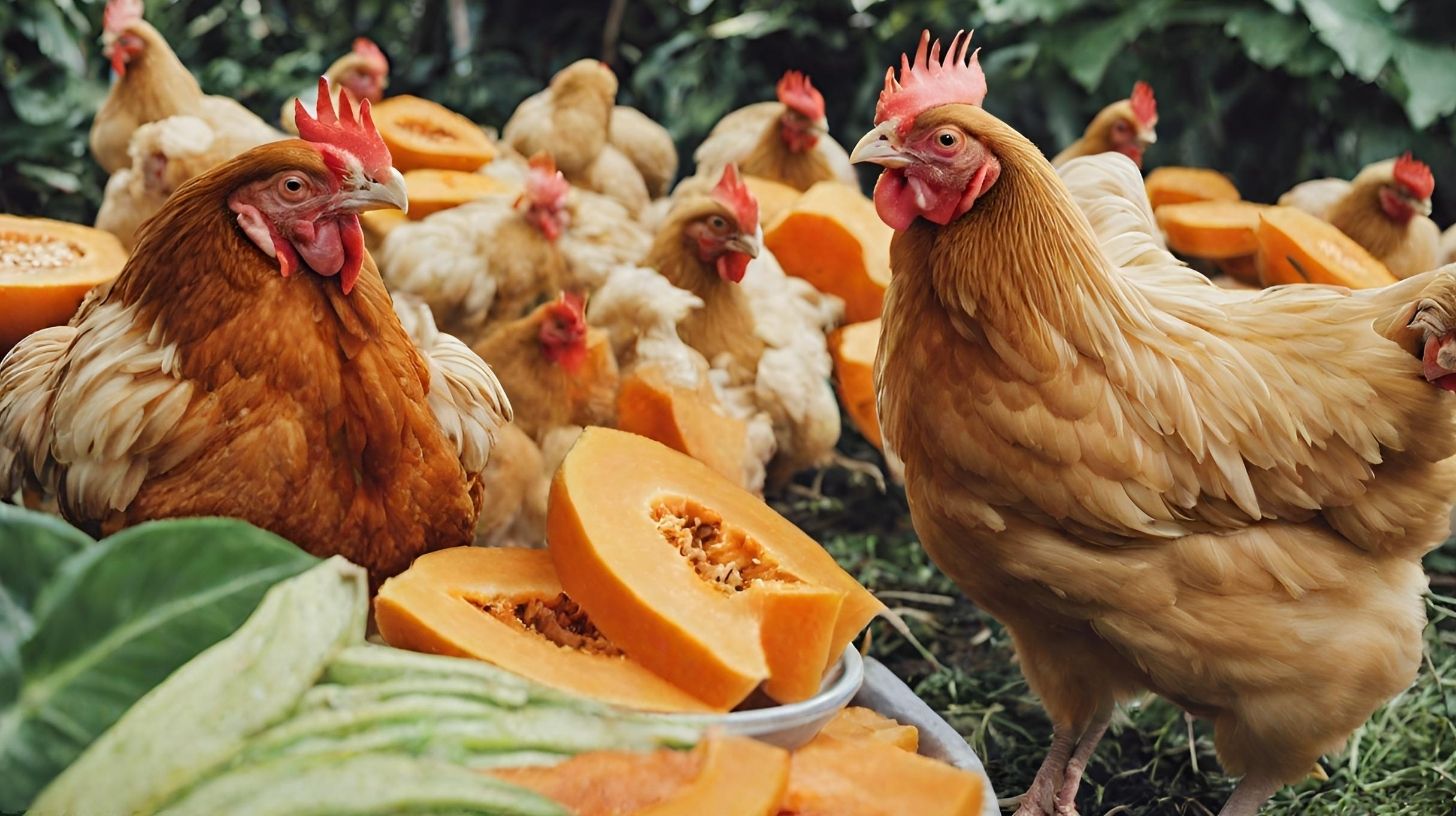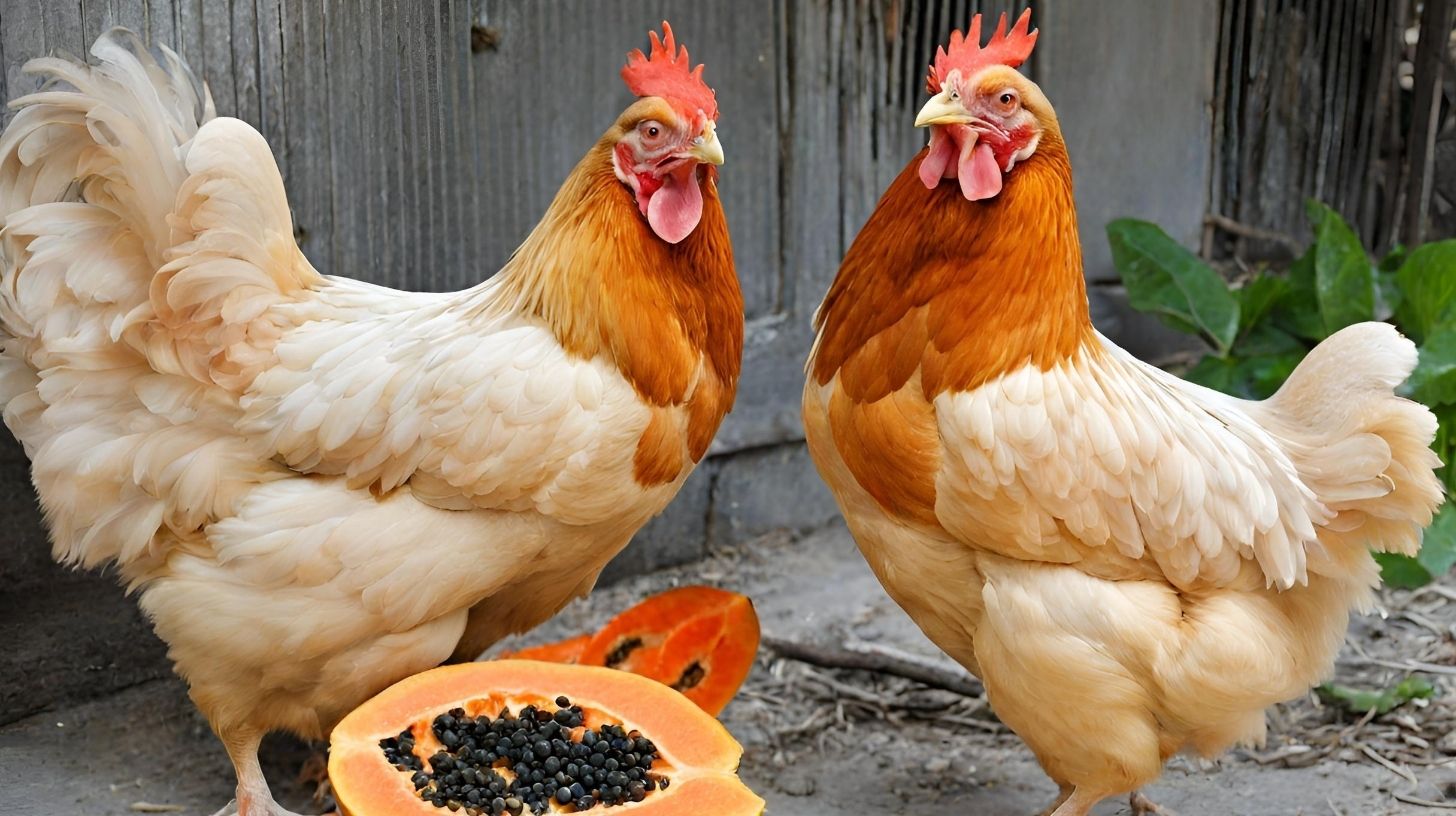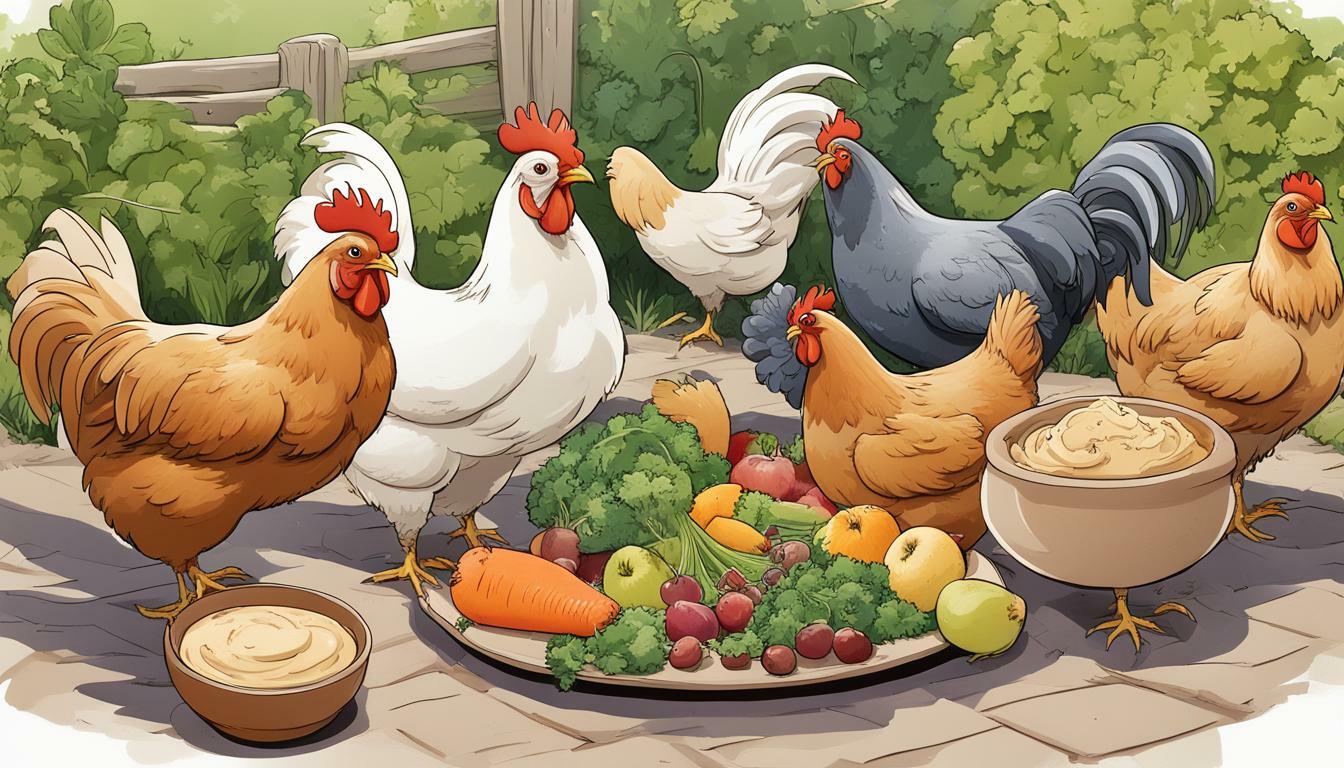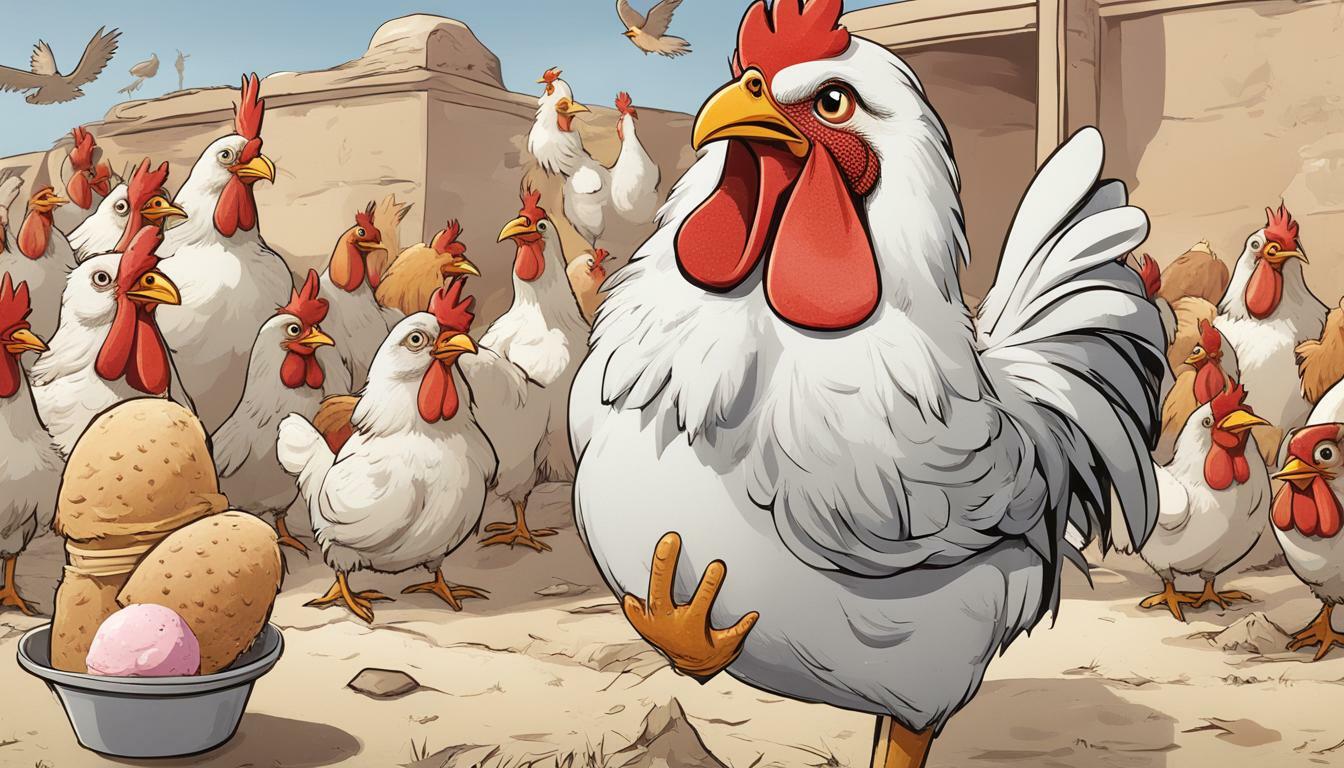Can Chickens Safely Eat Papaya? Benefits and Feeding Tips

Table of content:
- Is Papaya Good for Chickens?
- What Parts of Papaya Can Chickens Eat?
- How Much Papaya Can Chickens Eat?
- Benefits of Feeding Chickens Papaya
- Feeding Papaya to Chickens
- Are Papaya Seeds Safe for Chickens?
- Are Papaya Leaves Safe for Chickens?
- Can Chickens Choke on Papaya?
- Are Unripe Papayas Safe for Chickens?
- Health Benefits of Papaya for Chickens
- Can I Feed My Chickens Papaya Daily?
- FAQs About Feeding Papaya to Chickens
- Conclusion
Papaya, also known as Carica papaya, is a nutritious fruit that can be fed to backyard chickens in moderation as a healthy treat. Both the flesh, skin, seeds and leaves of papaya are safe for chickens to consume and provide a variety of vitamins, minerals and antioxidants that contribute to a chicken’s health.
Key Takeaways:
- Papaya is a nutritious treat for chickens that provides many health benefits. The flesh, seeds, skin and leaves are all safe for chickens to eat.
- Papaya contains important vitamins, minerals and antioxidants like vitamins A, C and B, folate, potassium and lycopene that can improve chicken health.
- The enzymes papain and chymopapain in papaya help improve digestion and egg production in chickens.
- Feed chickens ripe papaya in moderation along with their regular feed. Avoid unripe or semi-ripe papayas.
- Papaya seeds and leaves have unique health benefits and can be fed to chickens occasionally.
This complete guide will discuss the benefits of feeding chickens different parts of papaya, recommended feeding amounts, preparation tips and potential dangers to be aware of.
 Is Papaya Good for Chickens?
Is Papaya Good for Chickens?
The short answer is yes, ripe papaya is an excellent supplement to a balanced chicken diet. Here’s why:
- Papaya Flesh – The soft orange flesh of papaya provides vitamins A, C and B-complex vitamins, as well as potassium, magnesium, calcium and fiber. The vitamin C content boosts chickens’ immunity while the other nutrients contribute to overall health and development.
- Papaya Seeds – Papaya seeds are rich in proteins and omega-3 fatty acids. They contain beneficial enzymes like papain and chymopapain that support digestion and may improve egg production.
- Papaya Leaves – The leaves offer vitamins A, C and E, calcium, magnesium, sodium and antioxidants. Chickens enjoy foraging on the leaves.
- Papaya Skin – The peel is a good source of lycopene, an antioxidant that reduces inflammation. It also contains vitamins, minerals and fiber.
In addition to vitamins and minerals, papayas contain digestive enzymes like papain and chymopapain that break down proteins. This can improve digestion and nutrient absorption in chickens.
The antioxidants found in papayas like lycopene and vitamin C act as anti-inflammatories and can strengthen the immune system against disease.
Overall, incorporating ripe papaya as part of a balanced diet is an easy way to provide added nutrition to backyard chickens.
What Parts of Papaya Can Chickens Eat?
All parts of a ripe papaya are safe and healthy for chickens to eat including the flesh, skin, seeds and leaves.
Each part offers unique nutritional benefits:
- Flesh – The soft orange flesh of the papaya is what most people enjoy eating. For chickens, it provides antioxidants, vitamins and minerals.
- Seeds – Papaya seeds are edible for chickens. They are rich in beneficial enzymes that aid digestion.
- Leaves – Chickens can forage on papaya leaves which contain high levels of vitamins A, C and E.
- Skin/Peel – The skin is a great source of lycopene. Leaving it on provides added nutrition.
Avoid feeding chickens unripe or semi-ripe papaya flesh, as these can be harder to digest. Fully ripe papayas with orange flesh are ideal.
While all parts are edible, it’s not necessary for chickens to consume every part at once. The flesh can be fed as a treat, while seeds and leaves can be provided occasionally for variety.
How Much Papaya Can Chickens Eat?
Papaya should be fed to chickens in moderation, alongside their regular feed. Here are some guidelines on how much papaya chickens can eat:
- Adult chickens – About 1-2 spoonfuls of papaya flesh 2-3 times a week is sufficient.
- Chicks – Chicks can eat a half spoonful of papaya 2-3 times a week.
- Seeds – Around 1 teaspoon of papaya seeds twice a week is enough.
- Leaves – Handful of leaves can be provided once or twice a week.
Always monitor your chickens after introducing new foods. Decrease portions if any digestive issues arise.
While papaya is very nutritious, chickens should not eat large quantities as their main food source. Their diet should consist primarily of quality complete feed. Papaya is best served as an occasional treat.
Benefits of Feeding Chickens Papaya
Here is a summary of the major benefits papaya offers:
- Vitamins – Good source of vitamins A, C, E and B-complex vitamins. Help boost immunity and development.
- Minerals – Provides minerals like calcium, potassium, magnesium and sodium. Support bone and muscle health.
- Digestive Enzymes – Papain and chymopapain improve protein digestion and nutrient absorption.
- Antioxidants – Lycopene and vitamin C reduce inflammation and strengthen the immune system.
- Increased Egg Production – Enzymes and nutrients may improve egg production and quality.
- Foraging Opportunity – Chickens enjoy pecking at fresh papaya flesh, leaves and seeds.
- Healthy Treat – Ripe papaya is a low sugar, nutritious alternative to unhealthy snacks.
Feeding papaya provides added vitamins, minerals and enzymes that contribute to your flock’s optimal nutrition and health. It’s a great way to supplement their diet.
 Feeding Papaya to Chickens
Feeding Papaya to Chickens
Follow these tips for successfully feeding papaya to chickens:
- Ripe Flesh – Select papayas with fully ripe, orange flesh. Avoid unripe or semi-ripe fruit.
- Moderation – Papaya should be fed in limited amounts as a treat, not a main food.
- Variety – Mix in flesh, seeds, skin and leaves for variety.
- Chopped – Cut fruit into small pieces for easier eating. Mash for chicks.
- Separate Feeding – Offer papaya separately from regular feed to monitor intake.
- Storage – Refrigerate cut papaya. Use within 3 days. Discard if moldy.
- Hydration – Ensure chickens have access to fresh water. Papaya is hydrating.
- Watch Intake – Decrease portions if any diarrhea or digestive upset occurs.
Papaya is simple to prepare. Just peel, remove seeds if desired, chop the flesh and serve it to your eager flock!
Are Papaya Seeds Safe for Chickens?
Yes, papaya seeds are completely safe and healthy for chickens to eat.
The small black seeds inside the papaya’s center provide unique nutritional and digestive benefits.
Papaya seeds contain protective compounds called benzyl isothiocyanates that have antimicrobial effects. They help kill parasites and pathogens that can infect chickens.
The seeds also provide digestive enzymes called papain and chymopapain. These enzymes help chickens better absorb nutrients from their food for improved gut health and development.
In addition, papaya seeds provide valuable protein and omega-3 fatty acids. So while papaya flesh offers vitamins and minerals, the seeds provide complementary nutrients.
Around 1 teaspoon of papaya seeds two times a week is plenty for a chicken. They can be mixed into their feed or offered on their own.
Overall, papaya seeds are a nourishing supplement for chickens that supports good digestive health.
Are Papaya Leaves Safe for Chickens?
Yes, papaya leaves are edible for chickens and provide excellent nutrition. The leaves contain essential vitamins and minerals like:
- Vitamin A
- Vitamin C
- Vitamin E
- Calcium
- Magnesium
- Sodium
These nutrients help boost chickens’ immunity, digestion, bone health and more.
In addition, chickens enjoy foraging on and pecking at papaya leaves, making it a great boredom buster.
A handful of papaya leaves can be hung or scattered inside the coop once or twice a week. Ensure leaves come from pesticide-free papaya trees.
Overall, papaya leaves are a safe, healthy treat that provides nutrients and enrichment. In moderation, they make a great supplementary food.
Can Chickens Choke on Papaya?
While papaya flesh is soft, there is a low risk of chickens choking when they eat papaya pieces that are too large or swallow seeds whole.
To avoid choking hazards:
- Chop papaya flesh into small, bite-sized pieces for chickens.
- Crush papaya seeds before feeding to break down.
- Mash papaya flesh for chicks and juveniles.
- Supervise chickens when feeding papaya.
- Remove uneaten portions to prevent gorging.
With proper precautions, papaya can be fed safely. Monitor your flock and discontinue use if any choking is observed.
Are Unripe Papayas Safe for Chickens?
It’s best to avoid feeding chickens unripe papayas. While small amounts of unripe papaya flesh are not toxic, it may cause digestive upset.
Unripe papayas have higher concentrations of latex, which can be an irritant. They also contain more papain enzyme compared to ripe papayas. Excess papain can potentially damage the digestive tract lining if large amounts are consumed.
Lastly, unripe papaya flesh is harder to digest due to a higher content of cellulose fiber and starch.
For safety and nutrition, it’s ideal to feed chickens ripe papaya flesh with a sweet aroma and orange color. Discard any portions that are under-ripe with greenish tones.
Health Benefits of Papaya for Chickens
Here’s a summary of the top health benefits papaya offers:
- Increases egg production – The nutrients improve ovarian health.
- Boosts immunity – Antioxidants like lycopene and Vitamin C support the immune system.
- Improves digestion – Enzymes papain and chymopapain increase nutrient absorption.
- Acts as anti-parasitic – Papaya seeds help kill internal parasites.
- Strengthens bones – Vitamins A, E, minerals calcium and magnesium support bone health.
- Supports weight – Low in fat and calories while providing important nutrients.
- Reduces inflammation – Lycopene and Vitamin C reduce swelling and oxidative damage.
Feeding chickens papaya is an easy and delicious way to provide supplemental nutrition that supports their health from the inside out.
Can I Feed My Chickens Papaya Daily?
Papaya is a healthy treat, but should not be fed daily or in large quantities. Chickens should not eat papaya exclusively or as a main food source.
Here’s why:
- Papaya does not provide complete nutrition on its own. It lacks sufficient protein, for example.
- Too much papaya can cause nutritional deficiencies over time if fed as a sole diet.
- Excess Vitamin A found in papaya may cause toxicity if over-consumed.
- Large amounts can disrupt the calcium-phosphorus balance.
- Chickens may refuse their balanced feed if offered papaya daily.
The ideal diet for chickens consists of a quality complete feed appropriate for their age and stage of life. Fruits like papaya are best served 2-3 times weekly as a supplement, not an everyday diet.
Follow the recommended serving guidelines for optimal nutrition. Focus on moderation and variety when feeding treats.
FAQs About Feeding Papaya to Chickens
Can baby chickens eat papaya?
Yes, chicks can eat small amounts of ripe papaya starting at 2-3 weeks old once they transition to solid food. The flesh should be mashed or finely chopped into tiny pieces they can safely swallow. Avoid hard seeds until chicks are older. Keep portions small, around half a spoonful per chick.
Do chickens like papaya?
Most chickens do enjoy eating ripe papaya flesh, skin and seeds! The sweet flavor and soft texture seems pleasing to chickens. The nutrients and enzymes also benefit their health.
Should you peel papaya for chickens?
No, the peel or skin of papaya does not need to be removed. The skin contains beneficial antioxidants like lycopene and fiber. Leaving it on provides added nutritional value. Simply wash the papaya before cutting to remove any dirt or debris.
Can chickens eat papaya at night?
It’s best not to feed chickens papaya or treats right before roosting at night. The sugars and nutrients can give them a burst of energy that disturbs their sleep cycle. Offer papaya and other fruits during daylight hours.
Does papaya improve egg production?
Research shows the vitamins, minerals and enzymes in papaya may improve egg production by supporting reproductive health and nutrient absorption. The boost is most noticeable when chickens are fed papaya seeds and leaves.
Conclusion
Ripe papaya is a nutritious fruit that offers many vitamins, minerals and antioxidants that contribute to chickens’ overall health and development when fed in moderation.
The flesh, skin, seeds and leaves of the papaya all provide unique nutritional benefits ranging from digestive enzymes to immunity boosters. Adding papaya as a supplementary treat promotes good gut health, egg production and more.
Pay attention to serving sizes and feed ripe papaya 2-3 times a week at most. Along with their regular complete feed, enjoying small amounts of fresh papaya is a safe way to provide added nutrition and enrichment.
Welcome. I’m Adreena Shanum, the proud owner of this website, and I am incredibly passionate about animals, especially poultry. I founded adreenapets.com as a labor of love, stemming from my desire to share my knowledge and experiences with poultry enthusiasts worldwide.




